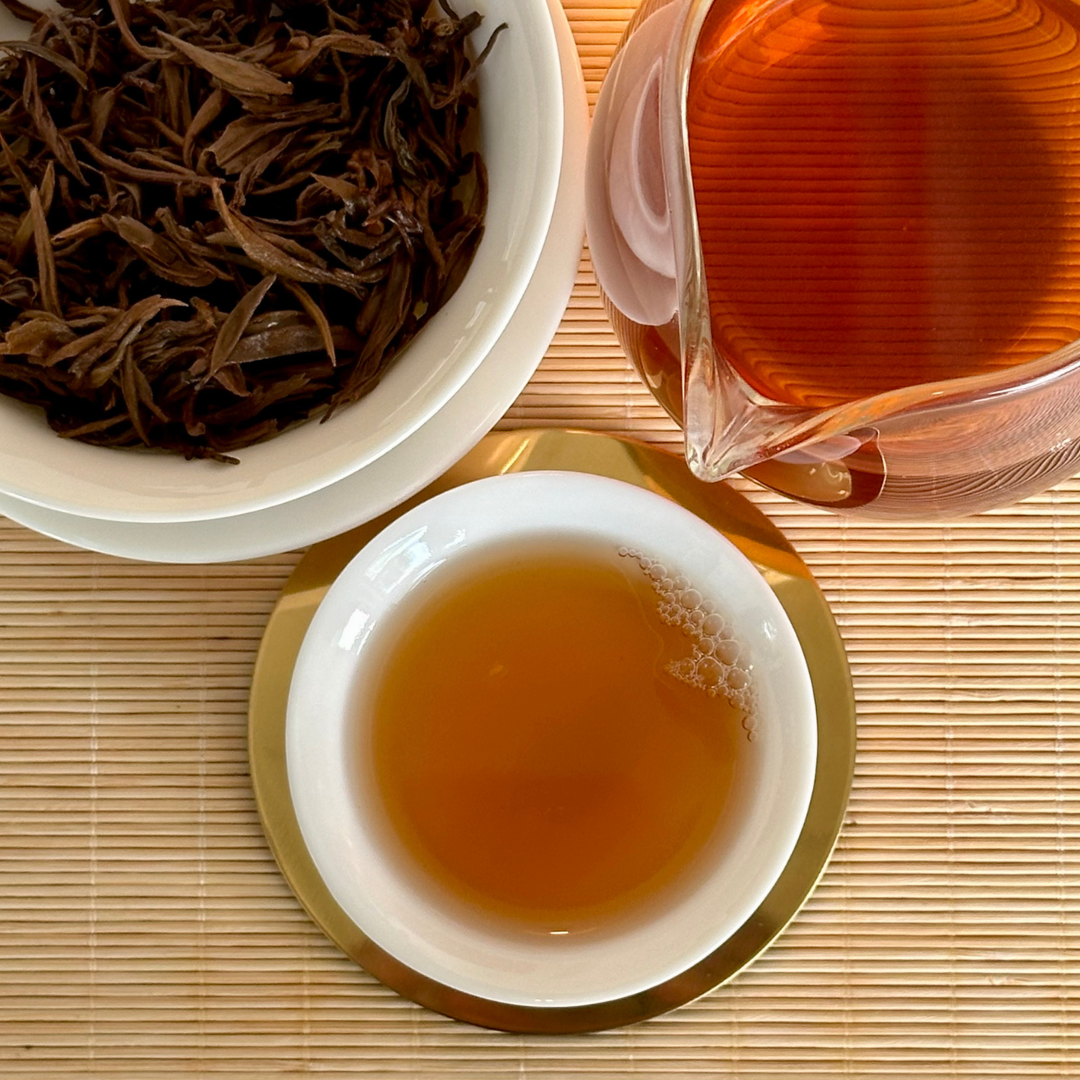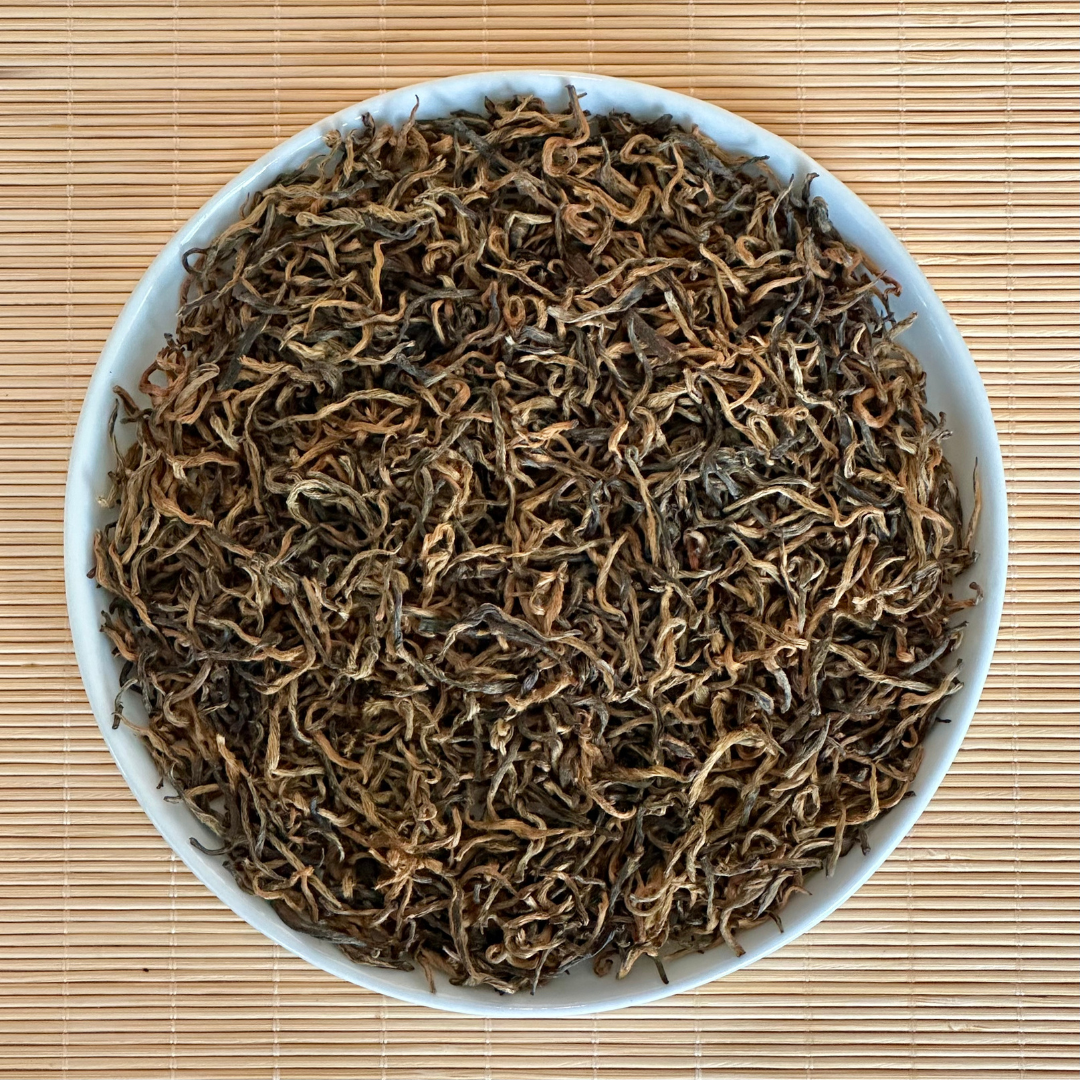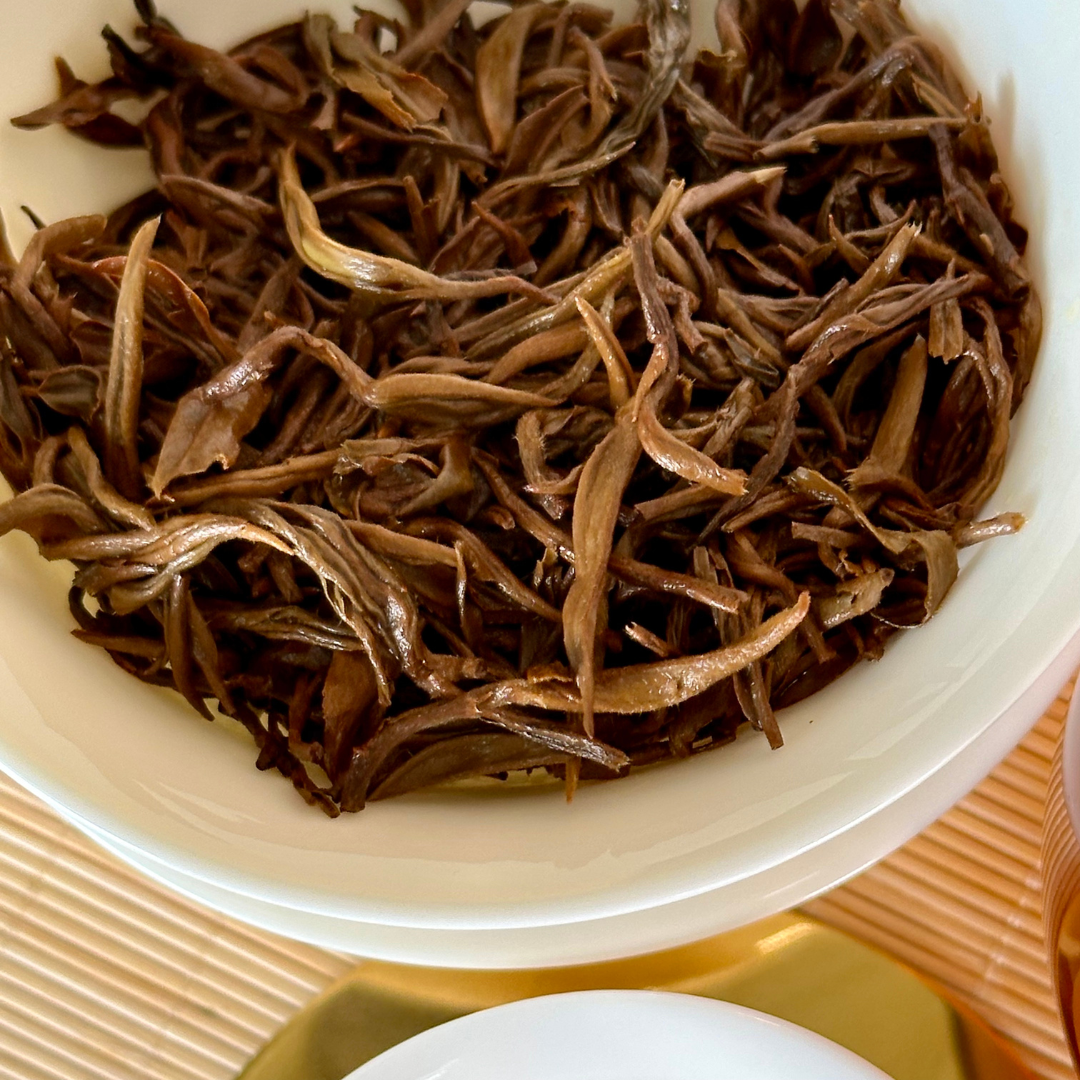 Image 1 of 6
Image 1 of 6

 Image 2 of 6
Image 2 of 6

 Image 3 of 6
Image 3 of 6

 Image 4 of 6
Image 4 of 6

 Image 5 of 6
Image 5 of 6

 Image 6 of 6
Image 6 of 6







Golden Eyebrow (Jin Jun Mei)
A delightful bud only high quality hong cha (red tea, but what we call black tea in the west) from the Wuyi Mountains.
Golden Eyebrow, aka Jin Jun Mei, is a rich and downy bud tea that offers a medium body and a soft, malty profile with delightful notes of lychee and rose. We love this tea for calm, focused energy. The name Jin Jun Mei translates to Golden Steed Eyebrows, reflecting the slender and twisted appearance of the buds. Carefully selected spring leaf buds from the Fu Yun #6 cultivar make this Wuyishan Black Tea a labor-intensive and demanding tea to produce. Grown at approx. 900 meters in the ecological preserve in the Wuyi Mountains, where pesticides and chemicals are prohibited, this tea maintains the natural terroir of the mountains, ensuring the legacy of Wuyishan tea. With its vibrant, juicy energy and intentional flavor profile, Jin Jun Mei is an outstanding afternoon tea that pairs wonderfully with light pastries, dark chocolate, mild cheeses, and savory dishes such as roasted poultry or seafood.
Tasting notes:
Malt | Rose | Honey | Lychee
50 gram pouch | approx. 16 servings (each serving can be infused multiple times)
100 gram pouch | approx. 33 servings (each serving can be infused multiple times)
Origin: Feng Shui Guang, Wuyishan, Fujian Harvest: Spring 2024 Ingredients: Cultivated without chemicals black tea
A delightful bud only high quality hong cha (red tea, but what we call black tea in the west) from the Wuyi Mountains.
Golden Eyebrow, aka Jin Jun Mei, is a rich and downy bud tea that offers a medium body and a soft, malty profile with delightful notes of lychee and rose. We love this tea for calm, focused energy. The name Jin Jun Mei translates to Golden Steed Eyebrows, reflecting the slender and twisted appearance of the buds. Carefully selected spring leaf buds from the Fu Yun #6 cultivar make this Wuyishan Black Tea a labor-intensive and demanding tea to produce. Grown at approx. 900 meters in the ecological preserve in the Wuyi Mountains, where pesticides and chemicals are prohibited, this tea maintains the natural terroir of the mountains, ensuring the legacy of Wuyishan tea. With its vibrant, juicy energy and intentional flavor profile, Jin Jun Mei is an outstanding afternoon tea that pairs wonderfully with light pastries, dark chocolate, mild cheeses, and savory dishes such as roasted poultry or seafood.
Tasting notes:
Malt | Rose | Honey | Lychee
50 gram pouch | approx. 16 servings (each serving can be infused multiple times)
100 gram pouch | approx. 33 servings (each serving can be infused multiple times)
Origin: Feng Shui Guang, Wuyishan, Fujian Harvest: Spring 2024 Ingredients: Cultivated without chemicals black tea
A delightful bud only high quality hong cha (red tea, but what we call black tea in the west) from the Wuyi Mountains.
Golden Eyebrow, aka Jin Jun Mei, is a rich and downy bud tea that offers a medium body and a soft, malty profile with delightful notes of lychee and rose. We love this tea for calm, focused energy. The name Jin Jun Mei translates to Golden Steed Eyebrows, reflecting the slender and twisted appearance of the buds. Carefully selected spring leaf buds from the Fu Yun #6 cultivar make this Wuyishan Black Tea a labor-intensive and demanding tea to produce. Grown at approx. 900 meters in the ecological preserve in the Wuyi Mountains, where pesticides and chemicals are prohibited, this tea maintains the natural terroir of the mountains, ensuring the legacy of Wuyishan tea. With its vibrant, juicy energy and intentional flavor profile, Jin Jun Mei is an outstanding afternoon tea that pairs wonderfully with light pastries, dark chocolate, mild cheeses, and savory dishes such as roasted poultry or seafood.
Tasting notes:
Malt | Rose | Honey | Lychee
50 gram pouch | approx. 16 servings (each serving can be infused multiple times)
100 gram pouch | approx. 33 servings (each serving can be infused multiple times)
Origin: Feng Shui Guang, Wuyishan, Fujian Harvest: Spring 2024 Ingredients: Cultivated without chemicals black tea
-
Jin Jun Mei is a well regarded black tea originating from the Wuyi Mountains in Fujian Province, China. Known for its exquisite quality and unique flavor profile, Jin Jun Mei has garnered a significant reputation among tea connoisseurs. Created in 2005 by tea master Jiang Yuanxun, it quickly became a symbol of premium quality due to its complex processing techniques and the pristine environment in which it is grown. The Wuyi Mountains, known for their misty, humid climate and rocky terrain, provide ideal conditions for producing high-quality tea. The unique mineral-rich soil contributes to the tea's distinctive flavor.
The tea is made exclusively from the delicate buds of the tea plant, handpicked in early spring from high-altitude areas of the Wuyi Mountains. The careful processing of these buds results in a tea that is rich, smooth, and full-bodied. The flavor of Jin Jun Mei is complex, with a harmonious balance of sweetness, maltiness, and hints of floral and fruity notes. The liquor is a beautiful golden color, and the aroma is captivating with hints of honey, dried fruit, and cocoa, leaving a sweet, lingering aftertaste.
Jin Jun Mei holds a special place in Chinese tea culture due to its craftsmanship and the rarity of the raw materials. It is often given as a luxurious gift and enjoyed during special occasions, symbolizing the innovative spirit of Chinese tea makers who continue to create new and exciting teas while preserving traditional methods.
-
Black tea's journey begins in the 17th century in the small village of Tongmu, nestled within a steep mountain valley. During this time, the tea in the village was processed as green tea. The local villagers, relying heavily on tea and bamboo cultivation to survive the harsh winters, faced a significant challenge when a crafty general decided to surprise his enemy by sending his troops through the mountain path that ran directly through Tongmu Village.
One spring, after the tea picking had been completed, soldiers trampled through the village, forcing the villagers to flee and hide in the mountains. The soldiers consumed the villagers' minimal food supply and slept on the freshly picked tea leaves, leaving them broken and heavily oxidized. Upon their return, the villagers found their tea leaves in a state of ruin. To salvage their crop, one villager suggested roasting the leaves over horsetail pine charcoal, a local tree, to mask the strong, over-oxidized smell. This innovative approach resulted in a tea with a distinctive smoky flavor.
Hoping for the best, the villagers begged a local merchant to take their altered crop. To their astonishment, the tea garnered a positive response, and the following year brought not only a profit but also a request for more of this unique pine-roasted tea. Thus, Lapsang Souchong was born, marking the inception of black tea.
Lapsang Souchong's fame quickly spread beyond its native region. By the late 17th century, Dutch merchants had introduced it to Europe. The tea became a favorite among the British royal family and soon sparked the "afternoon tea" tradition that continues to this day. During the Qing Dynasty, Lapsang Souchong's international popularity soared. Historical records from the period indicate that 85% of black tea exported from China was Zheng Shan Xiao Zhong, known outside China as Bohea (pronounced boo-hee) tea or Lapsang Souchong. Despite imitations by farmers in other regions, the authentic Lapsang Souchong from Tongmu Village remained unparalleled in quality.
Disclaimer: The account of troops passing through Tongmu Village and the subsequent accidental creation of Lapsang Souchong is a well-known legend in tea history. While it is widely accepted and repeated, specific historical evidence for this exact event is limited.
-
Rich in Antioxidants: Helps reduce oxidative stress and promote overall health.
Digestive Aid: Known to aid in digestion and soothe the stomach.
Stress Reduction: The act of brewing and savoring the tea, along with its comforting aroma, can help reduce stress.
Sustained Energy: Contains moderate caffeine levels, providing a gentle and sustained energy boost.
-
Preparation Method
Western Preparation:
Use 3 grams of tea per 6-8oz of 200-205°F (91-96°C) using a teapot or infuser mug
Steep for 2-3 minutes
Good for multiple steeps
Eastern Preparation (Gong Fu Cha):
Use 4 grams of tea per 100ml of water at 205°F (96°C) using a gaiwan or small teapot
Steep for 15-20 seconds
Increase steeping time by 5-10 seconds with each subsequent infusion
Enjoy multiple infusions to savor the evolving flavors

